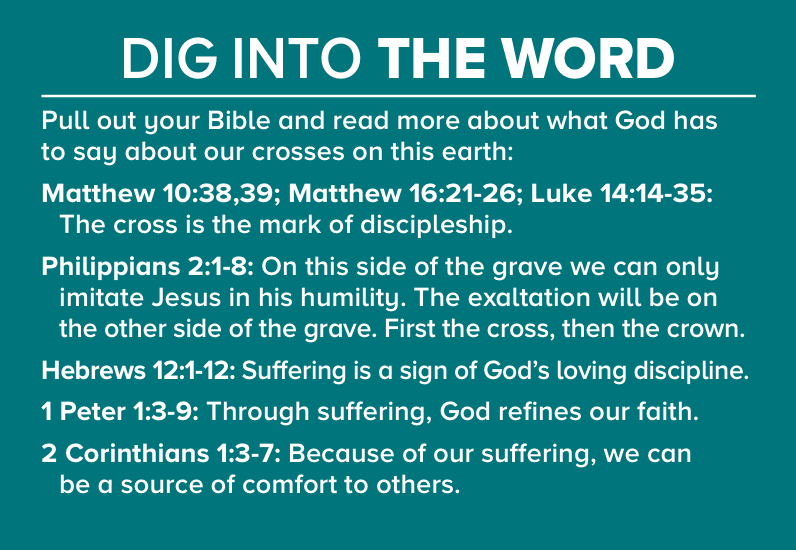 |
She was lying in the hospital bed awaiting the test results. She was facing surgery and a long recuperation. As I stood by her bedside, she asked, “Why is God allowing me to suffer like this?”
That’s not an uncommon question for believers. Job struggled with it and so did the early Christians as they faced opposition and even persecution. We struggle with it as well. So, what’s the answer?
The answer is really the cross, the one on which Christ died to win our salvation and the crosses that God allows us to carry to keep us close to his cross.
Paul’s cross
Perhaps, no better example of this is the apostle Paul himself. God had blessed Paul in many ways, both spiritually and physically. Paul was well educated and well traveled. He was called directly by Jesus to be the apostle to the Gentiles, and God used him to write many of the books in the New Testament. On top of all those blessings, God allowed Paul to see heaven, a sight that was so spectacular he couldn’t put it into human words.
But that doesn’t mean Paul’s life was without hardship. In his gospel work he was often ridiculed, rejected, beaten, stoned, imprisoned, and run out of town. He suffered shipwreck, cold, and hunger. His was a hard ministry.
Through our crosses, God keeps us close to the Savior’s cross.
Then on top of all that, the Lord allowed Paul to suffer a thorn in the flesh that Satan used to pummel him. What that thorn was we don’t know. But what we do know was that Paul asked God three times to take away this suffering. And what was the Lord’s answer?
It was no.
Why would God say no? Didn’t Paul have enough struggles? Didn’t God love Paul anymore? Was God angry with Paul? Should Paul have been running for cover rather than praying for help? No! The Lord was using that thorn to keep Paul from becoming conceited because of all the things that he was allowed to see and do. Paul himself explains:
To keep me from becoming arrogant due to the extraordinary nature of these revelations, I was given a thorn in my flesh, a messenger of Satan, to torment me, so that I would not become arrogant. Three times I pleaded with the Lord about this, that he would take it away from me. And he said to me, “My grace is sufficient for you, because my power is made perfect in weakness.” . . . For whenever I am weak, then am I strong. (2 Corinthians 12:7-10)
In other words, God said no because he wanted Paul to remember that the power and success of his life and ministry as a Christian and his hope for heaven weren’t because of Paul. It was God’s way of helping Paul remember that he was only a jar of clay and that the treasure in and the power of such jars of clay was the message of the cross that God had given him to believe and to preach.
Our suffering
In Paul’s experiences with suffering, we can find some answers for our own suffering. When suffering comes into our lives, it’s not because God doesn’t love us. It’s not because somehow we have lost God’s favor. It’s because God knows what’s best for us.
Yes, there are times when God will remove hardships and difficulties from us when we ask because he knows that is what we need. But there will be those times when he will allow us to endure hardships, loss, and even a thorn in the flesh because he knows that is what’s best for us. God knows exactly what each of us needs to keep us humbly relying on his power and his grace—in good times as well as bad. We may not understand and we may disagree, but through our crosses, God keeps us close to the Savior’s cross.
That, dear friends, is the main point of it all. What Paul learned—and what we have to learn—is that if and when the day of suffering comes, we can trust that God has something better for us. God told Paul what that was:
“My grace is sufficient for you, because my power is made perfect in weakness.” Therefore, I will be glad to boast all the more in my weaknesses, so that the power of Christ may shelter me. That is why I delight in weaknesses, in insults, in hardships, in persecutions, in difficulties, for the sake of Christ. For whenever I am weak, then am I strong. (2 Corinthians 12:9,10)
When Paul suffered insults, hardships, and persecutions for Christ and when he learned that his thorn in the flesh would not be taken away, where did he find the strength to endure? Paul’s crosses brought him back to the Savior’s cross. And when Paul relied on the Savior and his grace, then he was strong in his faith and in his patience to endure those sufferings.
That is true for us too. When it seems that God says no to our request to take some burden away, we know that he has something better for us—his grace and power that will be sufficient to keep us.
God’s grace
Think about one of the most difficult times in your life, a time when you thought you couldn’t handle it anymore and yet somehow you did. What was it that ultimately carried you through? Wasn’t it the power of God’s grace in your life? You see, when you are at your weakest, that’s when you are actually at your strongest. That was the time you turned to God in prayer and relied on his power. That was the time you cried out for mercy and turned to the powerful promises of God’s Word. God uses your crosses, your suffering in life, to keep you close to the Savior’s cross. Isn’t that the best thing for you?
Remember how the greatest of God’s blessings came to us all through God’s answer to the prayer of our dear Lord Jesus himself? In the Garden of Gethsemane, Jesus asked if his heavenly Father would take away his cup of suffering. What was his Father’s answer? It was no. Why would the Father say no to his own Son? Didn’t he love his Son? Wasn’t he pleased with his Son? God did not remove the suffering from Jesus because he wanted something better for us—eternal life in heaven.
So dear friends, when the day of suffering comes and God says no when you ask him to take it away, trust that he knows better. Trust that he has something better for you and for others. Then trust, as Paul did, in God’s grace by which he saved you for heaven and through which he strengthens you on earth.
The Scripture references used in this article are from the Evangelical Heritage Version.
Author: Bruce A. McKenney
Volume 107, Number 07
Issue: July 2020
- Please explain: Why is the physical resurrection of Jesus Christ from the dead so important?
- Please explain: Why did God give the Ten Commandments?
- Please explain: Why does the Bible call Satan “the god of this age”?
- Please explain: What sets Old Testament Israel apart from other people?
- Please explain: Why is the virgin birth of Christ important?
- Please explain: Am I really a saint?
- Please explain: What does it mean that “many are invited, but few are chosen”?
- Please explain: How is church discipline a loving practice of the church?
- Please explain: Can a Bible verse be overused or used at an inappropriate time or setting?
- Please explain: What can I do when my relationship with Jesus causes family problems?
- Please explain: What good can possibly come from the persecution of Christians?
- Please explain: What is the Holy Spirit’s role in the life of a Christian?
- Please explain: What does it mean that Jesus’ enemies would become a footstool for his feet?
- Please explain: What do people mean when they say that they have been “born again”?
- Please explain: What does it mean that Christians are priests before God?
- Please explain: If I have been baptized, does that mean I have been anointed?
- Please explain: Can Christians be so heavenly minded that they are of no earthly good?
- Please explain: The world is a mess. Why doesn’t Jesus do something about it?
- Please explain: Why is Holy Communion so important to confessional Lutherans?
- Please explain: What does it mean to give up everything to follow Jesus?
- Please explain: If I worry, am I doubting God?
- Please explain: What is the point of praying?
- Please explain: Where do we get the idea of the Trinity when that word isn’t mentioned in the Bible?
- Please explain: If Jesus is the Good Shepherd, how can he also be the Lamb of God?
- Please explain: What’s the big deal about Easter?
- Please explain: Why should we love our enemies?
- Please explain: Why did Jesus do miracles?
- Please explain: As a Christian, what does it mean to be humble?
- Please explain: What does it mean to have your name written in God’s book?
- Please explain: Is God’s design for marriage relevant in today’s world?
- Please explain: Does God favor certain people?
- Please explain: Why do I so often fail to do what God wants?
- Please explain: Why is the church always talking about money?
- Please explain: How does God’s kingdom grow?
- Please explain: Why are only Christians’ works good, but the same works by others are not?
- Please explain: How do we know that Jesus rose from the dead?
- Please explain: If the Sabbath law no longer applies, why do I have to go to church?
- Please explain: Why did God cruelly command Abraham to sacrifice his son?
- Please explain: Does Christian freedom give me the right to do anything?
- Please explain: Is heaven going to be boring?
- Please explain: Why is Jesus taking so long to return?
- Please explain: Why did Jesus use parables to teach?
- Please explain: Does Jesus build his church on Peter and his successors?
- Please explain: How can I be a Christian when there are so many hypocrites in the church?
- Please explain: Why should I be a Christian when I have to suffer?
- Please explain: How do I know whom to believe now that Jesus is gone?
- Please explain: How can Jesus be our friend if he isn’t physically here on earth?
- Please explain: Why can’t my sister have communion with us?
- Please explain: Whom do we blame for bad things?
- Please explain: Are sins of thought as bad as committing the actual sin?
- Please explain: What makes God unique?






